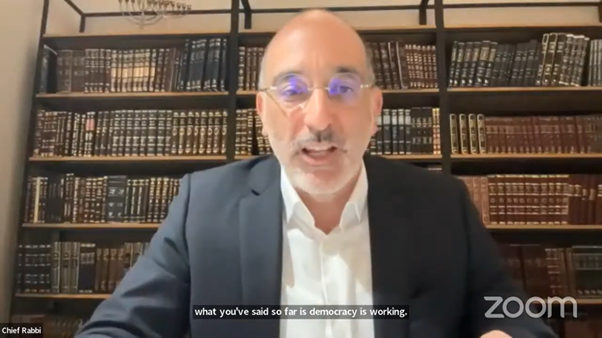Banner
End of an era as ANC crumbles

Political analyst Dr Frans Cronje believes there’s a strong likelihood that the African National Congress (ANC) will lose its majority in the National Assembly in 2024, according to his data. The party will no longer be able to do as it pleases and face automatic re-election. Polling indicates that the ANC has dropped in popularity from about 70% of voters in 2004 to about 40% or less today. The Democratic Alliance’s (DA’s) support is up to 30%.

“As the ANC fails to meet the expectations of people in their millions, they are beginning to abandon that party and look for pragmatic alternatives in the country’s political opposition. Whoever is going to govern after the 2024 election is going to be in a coalition,” Cronje said.
Cronje, the director of the Social Research Foundation (SRF), was in conversation with Chief Rabbi Dr Warren Goldstein in a webinar on 1 March. Cronje, known for his incisive and forthright analysis, spent almost 20 years at the South African Institute of Race Relations.
His approach entails “a cold, hard look at the data that informs the country, a good understanding of history, and being excellently informed on the ground on what politicians, business people, and foreign diplomats say about the country. There’s no guesswork. There’s no dreaming. There’s just calls on what’s happening now and what’s going to happen.”
Cronje was among those who cautioned that the enthusiasm around Cyril Ramaphosa replacing Jacob Zuma as president – “Ramaphoria” – was misplaced. Predicting that Ramaphosa would disappoint as a leader made him unpopular in the country’s boardrooms.
He reminded the audience of former State President PW Botha’s disappointing and defiant Rubicon speech in Durban in August 1985. “The context wasn’t dissimilar to that of today. Growth rates were very low. There was violent political anarchy across the country. Young white conscripts were engaged in running battles with black liberation movement activists. The country was in a bad space. The Cold War was on the go. Botha said, ‘We will not change under pressure, we will carry on.’ It was a dark moment.”
No-one believed that in a decade, South Africa would have hammered out a political settlement, or that the ANC government in its first decade in office would cut debt levels in half, secure a budget surplus, and double the number of people in employment, Cronje said. So, there’s always hope of positive change.
In spite of the ructions in South Africa’s large metropolitan municipalities, coalition governments can function efficiently elsewhere. “Our electoral system lends itself to coalitions,” Cronje said, “and I doubt we’ll have the situation where one dominant party can impose its will ever again. In many smaller towns, coalitions work well where parties work with each other to find solutions that benefit the people. Parties that foil coalitions are exposed for that. It’s reasonable that in the fullness of time, the country’s coalitions will work better.”
The SRF’s polling research indicates that South Africans aren’t as polarised as some want us to think. “People have the same value system, they have the same expectations of what should be done to fix the problem, and they want the same things for their children,” Cronje said.
Cronje said that with an ANC-Economic Freedom Fighters (EFF) coalition, “The country will get significantly worse. It would be an extinction-level event. It’s a realistic prospect, and it’s extremely dangerous, to combine the ANC brand of incompetence and corruption and the EFF brand of anarchy and violence. The ANC is weak in the urban areas – it’s a rural party now. By the 2029 election, I expect to see the ANC get somewhere between 20% and 30%.” It has lost support of the young, the tertiary-educated, and the employed, he said. “The black middle class will abandon its party in time, and it will be the end of Africa’s great liberation movement.” Cronje said a pragmatic ANC-DA coalition would bode well for the country, and even a DA small-party coalition that excluded the ANC.
“In the South African Jewish community, there are a growing number of people who can’t come out at the end of the month,” said Goldstein. “You cannot rely on government services for anything, so therefore, there’s private security, private education, private healthcare, and now people have to provide their own electricity and water. There’s real anxiety about the future.
“A few weeks ago, I was in a meeting where religious leaders actually said to the president that load shedding was inflicting much more suffering on the people of South Africa than COVID-19,” said Goldstein.
“When I hear that the chief rabbi hasn’t had a bath for three days due to water shortages, we must know things are very, very serious,” Cronje retorted. He said there was much the government could do to add megawatts to the national electricity grid to reduce load shedding stages including buying enough diesel for gas turbines, proper plant maintenance, and better-quality coal for running power stations, even before considering renewable energy or independent power producers.
“If sufficient resources are made available to the country’s pro-democracy organisations, it will be possible to thwart every major attack on the country’s democratic institutions, from freedom of speech reports, property rights, to the market economy and electoral system,” Cronje said.
After the webinar, Cronje told the SA Jewish Report that people across the board were extremely concerned about where things were heading and were “slightly lost for direction”. But he feels the chances for reform are better now than they were five years ago. He said he couldn’t tell people whether to emigrate. “They must weigh up the evidence, and make an informed decision in the best interests of them and their families. It’s a very difficult choice.”

Choni Davidowitz
March 14, 2023 at 2:16 pm
Bottom line: Those who bless Israel will be blessed, those who curse Israel will be cursed. A word to the wise is sufficient.